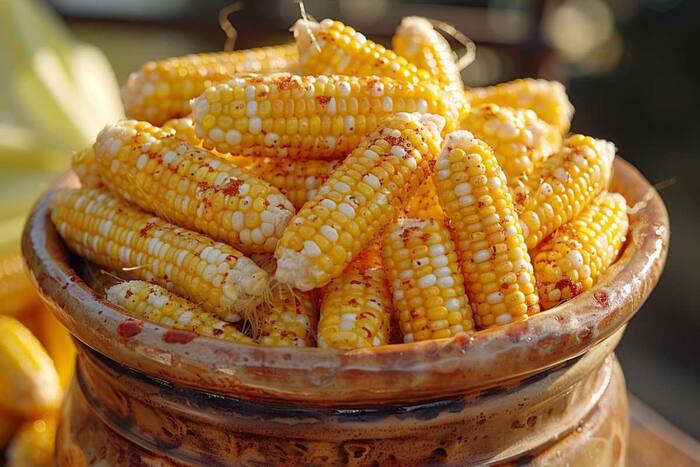
By clicking “Accept All Cookies”, you agree to the storing of cookies on your device to enhance site navigation, analyze site usage, and assist in our marketing efforts Cookies Policy.

Corn is a staple food enjoyed in many cuisines around the world, but several myths about it persist. Here are some common misconceptions about eating corn, along with the truths:
Truth: Corn can be part of a healthy diet when consumed in moderation. It’s a source of fiber, vitamins, and minerals. While it does contain carbohydrates, it’s also nutrient-dense and can contribute to a balanced diet. Weight gain is more about overall calorie consumption and lifestyle rather than a specific food.
Truth: Corn is a complex carbohydrate with a range of nutrients. It provides fiber, vitamins (such as vitamin C and B vitamins), and minerals (including magnesium and potassium). Whole corn and corn products can offer health benefits, particularly when eaten as part of a varied diet.
Truth: While corn is high in fiber, which can be beneficial for digestion, some people may experience digestive discomfort if they consume it in excess or if they have a sensitivity to certain components. For most people, corn can aid in digestion and contribute to regular bowel movements.
Truth: Corn provides essential nutrients and antioxidants, such as lutein and zeaxanthin, which are beneficial for eye health. Although it might not have the same nutrient profile as some other vegetables, it still contributes valuable nutrients to the diet.
Truth: Corn has a moderate glycemic index, meaning it can have a moderate effect on blood sugar levels. It is better consumed in its whole form rather than as processed products. When eaten as part of a balanced meal with fiber and protein, it can be managed within a healthy diet for blood sugar control.
Truth: While a significant portion of corn grown in some regions is genetically modified (GM), non-GM and organic corn varieties are also widely available. It’s possible to choose non-GM corn if that is a concern.
Truth: Corn is not just empty calories. It provides important nutrients and fiber that contribute to overall health. The nutritional profile of corn can vary depending on how it is prepared and consumed.
Truth: Corn can be consumed in its whole form, such as fresh corn on the cob or popcorn, as well as in various processed forms. Whole corn products, such as whole-grain cornmeal and tortillas, can be part of a nutritious diet.
Truth: Corn allergies are relatively rare compared to other food allergies. While some individuals may have sensitivities to corn or its derivatives, the majority of people can consume corn without adverse effects.
Truth: Corn alone does not cause nutrient deficiencies when consumed as part of a varied and balanced diet. It’s important to eat a wide range of foods to ensure all nutritional needs are met.
By addressing these myths, it becomes clear that corn can be a nutritious and valuable part of a balanced diet when consumed appropriately.
For breaking news and live news updates, like us on Facebook or follow us on Twitter and Instagram. Read more on Latest Dishes News on India.com.